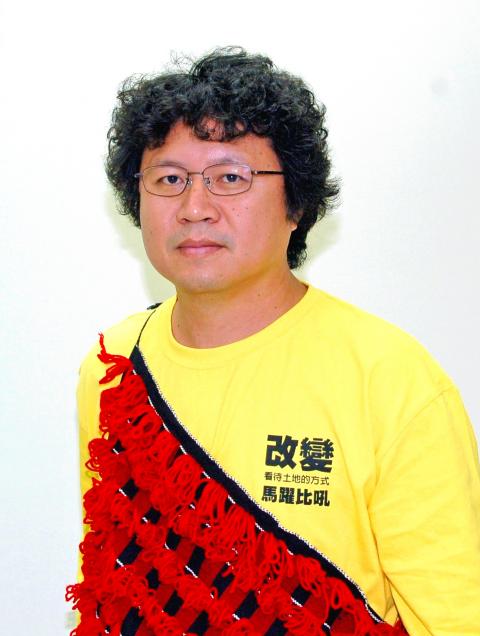Aboriginal activist Mayaw Biho yesterday abruptly resigned as chief director of the state-run Taiwan Indigenous Television (TITV), accusing the station’s chairperson and board directors of interfering in the network’s editorial independence and operations.
“I regret that, prior to the 18th meeting of the board of directors today [yesterday], I have decided to resign as chief director of the station, because I have many doubts about TITV’s mission and structure, and these doubts are getting bigger and bigger, to the extent that they have affected the daily operation of the station,” Mayaw said on Facebook yesterday.
“I apologize to all those who have worked with me in the past year, especially those who had given up better opportunities to do so,” he said.

Photo: Chen Ching-min, Taipei Times
Mayaw said that under the administration of the Indigenous Peoples Cultural Foundation, TITV’s objectives have become focused on preserving and promoting Aboriginal culture and education, while neglecting its other duties.
“We may have fulfilled our duty of providing education and entertainment for the nation’s Aborigines, but we have failed to serve as a watchdog and messenger,” he wrote.
For instance, Mayaw said, besides broadcasting news about cultural events, TITV should provide more coverage and critique of public issues related to Aborigines.
“To solve the problem, I think it is important to establish a system, to make a law to regulate TITV. We have a law on public broadcasting systems, but we also need separate legislation for TITV, which was spun off from Taiwan Broadcasting System last year,” Mayaw said.
“In countries that have independent TV stations for Aboriginal populations, such as Canada and New Zealand, there are separate laws governing those stations,” he said.
He also accused TITV’s board and chairperson Mayaw Fotol of being “unfriendly” and trying to reduce the TV station’s media independence, but declined to reveal more details.
Mayaw Fotol said that the board had received Mayaw Biho’s letter of resignation the night before, but would not comment until the board has discussed the matter.
“We respect his right to say what he has to say, but at the moment, he is still the chief director of the station and is welcome to take part in board meetings if he wishes,” Mayaw Fotol said.
Mayaw Biho, a documentary director and former legislative candidate, surprised many when he became TITV’s first chief director last year after its spinoff from Taiwan Broadcasting System.

AGING: As of last month, people aged 65 or older accounted for 20.06 percent of the total population and the number of couples who got married fell by 18,685 from 2024 Taiwan has surpassed South Korea as the country least willing to have children, with an annual crude birthrate of 4.62 per 1,000 people, Ministry of the Interior data showed yesterday. The nation was previously ranked the second-lowest country in terms of total fertility rate, or the average number of children a woman has in her lifetime. However, South Korea’s fertility rate began to recover from 2023, with total fertility rate rising from 0.72 and estimated to reach 0.82 to 0.85 by last year, and the crude birthrate projected at 6.7 per 1,000 people. Japan’s crude birthrate was projected to fall below six,

US President Donald Trump in an interview with the New York Times published on Thursday said that “it’s up to” Chinese President Xi Jinping (習近平) what China does on Taiwan, but that he would be “very unhappy” with a change in the “status quo.” “He [Xi] considers it to be a part of China, and that’s up to him what he’s going to be doing, but I’ve expressed to him that I would be very unhappy if he did that, and I don’t think he’ll do that. I hope he doesn’t do that,” Trump said. Trump made the comments in the context

SELF-DEFENSE: Tokyo has accelerated its spending goal and its defense minister said the nation needs to discuss whether it should develop nuclear-powered submarines China is ramping up objections to what it sees as Japan’s desire to acquire nuclear weapons, despite Tokyo’s longstanding renunciation of such arms, deepening another fissure in the two neighbors’ increasingly tense ties. In what appears to be a concerted effort, China’s foreign and defense ministries issued statements on Thursday condemning alleged remilitarism efforts by Tokyo. The remarks came as two of the country’s top think tanks jointly issued a 29-page report framing actions by “right-wing forces” in Japan as posing a “serious threat” to world peace. While that report did not define “right-wing forces,” the Chinese Ministry of Foreign Affairs was

PREPAREDNESS: Given the difficulty of importing ammunition during wartime, the Ministry of National Defense said it would prioritize ‘coproduction’ partnerships A newly formed unit of the Marine Corps tasked with land-based security operations has recently replaced its aging, domestically produced rifles with more advanced, US-made M4A1 rifles, a source said yesterday. The unnamed source familiar with the matter said the First Security Battalion of the Marine Corps’ Air Defense and Base Guard Group has replaced its older T65K2 rifles, which have been in service since the late 1980s, with the newly received M4A1s. The source did not say exactly when the upgrade took place or how many M4A1s were issued to the battalion. The confirmation came after Chinese-language media reported